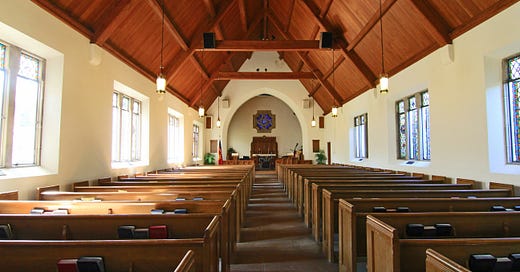Baptist and Pentecostal Black churches in America aren’t known for being quiet. As the Book of Psalms asks of Christians, the churches “make a joyful noise unto the Lord”—not for fun, but as worship. The choir praises God and rejoices through song, the congregation raises their hands and shouts “hallelujah,” and the pastor delivers an invigorating sermon, dabbing sweat off his forehead with a towel by the end. Then, they bow their heads in prayer.
For many Black people, the church is a place of worship and a safe space for fellowship and community. According to Celeste Beatty, a longtime churchgoer, “the church is one of the most important places.” But for many European tourists, Black American churches are a place for entertainment.
“It’s my first time in New York, and we know that it’s possible to see gospel,” said Julia, a visitor from Italy. “We are curious about that; we know of this opportunity and for this reason we come here.”
Thousands of tourists from France, Italy, Spain, and Germany visit Harlem for Sunday services during trips to New York City. According to Cecilia, another tourist from Italy, they seek an experience they can’t find at home. “We are used to live [sic] church in a different way,” she said. Notably, almost all the tourists visiting these churches are white.
On a Sunday morning outside Canaan Baptist Church, white European tourists formed two lines down the street over an hour before the service. At First Corinthian Baptist Church, tourists stood by a crowd control barrier while a security guard checked their bags and scanned them with a metal detector.
Abyssinian, the largest Baptist church in New York, must often turn tourists away when their visitor section fills its 1,000 seats. After Vincent, a member of Abyssinian, said that the church reached capacity, one tourist broke into tears; another began arguing with him. They were upset that church members could still enter—but the members didn’t come for a spectacle. They came to hear God’s word.
Harlem locals go to church services for varied but related reasons: Several churchgoers said that they primarily attended for the opportunity to hear the preacher’s sermon, worship the Lord, and learn more about Jesus Christ and salvation. “I’ve been going here for over twenty years. It’s a teaching church,” said Dawn, a member of First Corinthian. Many white European tourists said that they attended for a different reason: to hear gospel music.
“We are here just to see the gospel. We are a very, very big group in order to enjoy this show,” said Lorenzo, a visitor from Italy who attended a Baptist church service in a group of 40 tourists.
The visitors seek entertainment, which is clear to Harlem locals. “They don’t come to hear the sermon or the things that the church talks about,” Vincent said. “Most of them are here just for the music.”
Many international tourists visit churches around the world without a spiritual purpose. Approximately 20 million visitors go to the Notre-Dame Cathedral in Paris each year, many of whom are American tourists attending without religious objectives. However, visitors of European churches may have respect and reverence for the church and its purpose in a way that many white tourists might not have for Black American churches. As travel websites describe Black American churches as “spectacular,” “native,” and “a must-see attraction,” it’s not a secret that most of their visitors consider the services more of a show than a sacred experience.
“They come, thinking it’s like a Broadway show,” said Ricardo Ferguson, a member of Canaan Baptist Church. He hopes that the visitors will still hear the pastor’s message. “It’s here to learn God’s word,” he said. “Some of them just come for an experience. It’s just a vacation. But we’re here on this Earth to bring man closer to God, so hopefully we reach them.”
Some of Harlem’s regular churchgoers say that tourists negatively impact their experience. “That always made me feel extremely nervous,” said Jenni, a former New York City resident, in a TikTok video. “Thousands, in the pews, nothing but European faces looking at you sing and watching you do praise and worship made a place that used to feel safe feel very eerie for me and very uncomfortable.”
The Bible tells Christians to love their neighbors, welcome strangers, and invite foreigners into the Church—which preachers often emphasize in their sermons.
“And you are to love those who are strangers. Why? ’Cause you yourselves were strangers in Egypt,” said Pastor Damon Lynch, III during a sermon at New Prospect Baptist Church. “Because God loves them, you ought to love them.”
Many tourists might be taking advantage of that message, but Harlem’s churches welcome them with open arms.
“They come for the singing, and usually after that, they leave. They have other places to attend, other appointments and whatever,” said William Bazemore, a church Trustee. “But we welcome them.”




